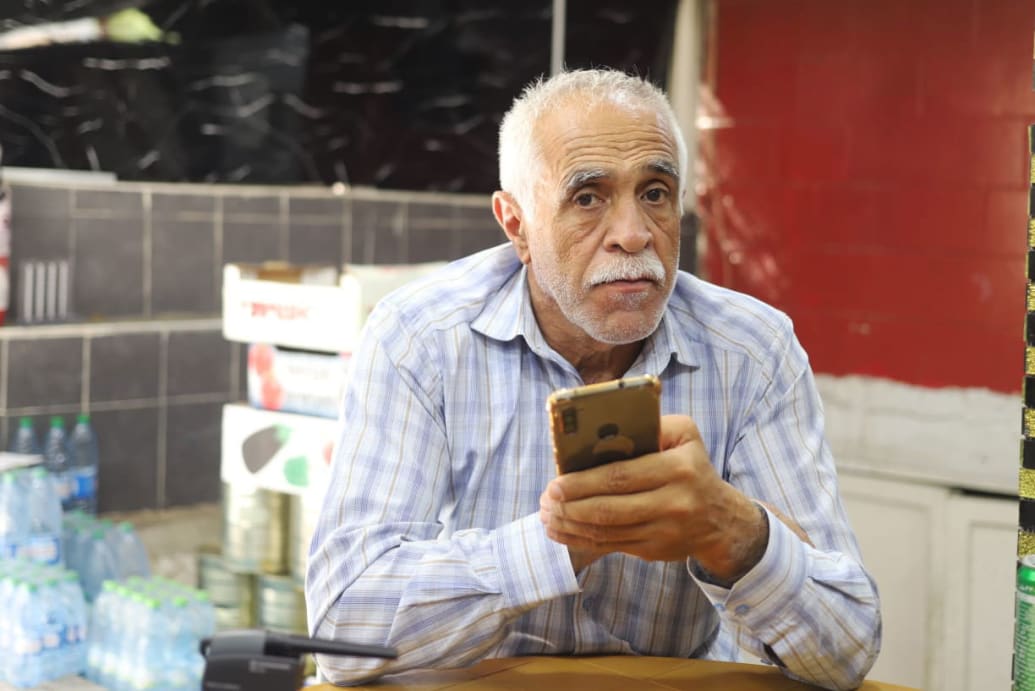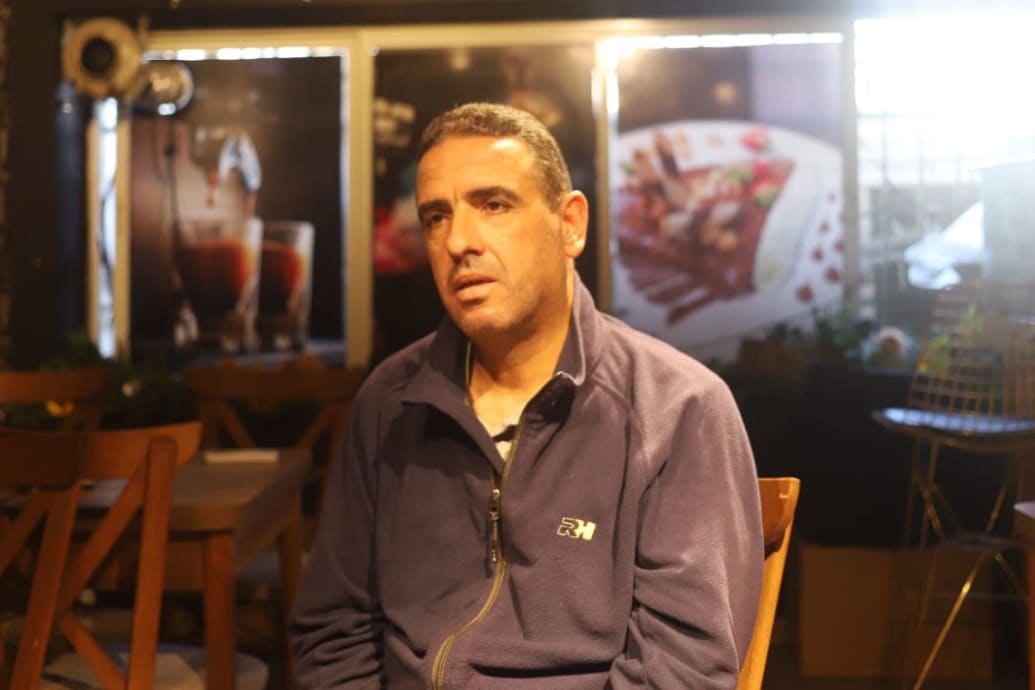HEBRON, West Bank—The first thing Bassam Abu Aisha saw when he left his house on Oct. 7 was a gun in his face. It was an Israeli settler, wearing an army uniform and pointing an M16 in his face. The settler was part of a mixed group that included IDF soldiers, who were patrolling in a group, despite the IDF’s supposed role as a neutral arbiter of disputes between the two communities.
In a video of the incident taken by a neighbor and shared with The Daily Beast, the man’s finger can be seen resting by the trigger. Later that day, Abu Aisha says that a group of armed settlers tried to break down his door, smashing it with their gun buts. They weren’t able to get in, he said, because of the thick bars and locks on his door.
The 60-year-old Palestinian taxi driver, who lives in the Tel Rumeida district of Hebron, told The Daily Beast that after learning of the Hamas massacres was fear, “the first thing we felt was fear. We knew that we were going to be the ones punished for what Hamas had done.”
For four days after the terror attacks that killed at least 1,400 Israelis, the Israeli authorities announced a curfew that locked down Tel Rumeida, an overwhelmingly Palestinian neighborhood, to ostensibly prevent violence between Palestinians and local Israeli settlers.
In a response to a comment request from The Daily Beast about this story, an IDF representative said that “security forces” in the area operate “in accordance with the situational assessment in order to ensure security for all residents in the area. In light of this, there are dynamic checkpoints and movement monitoring in various areas in the region,” without elaborating further.
Abu Aisha says that they were told that anyone who could be seen on the streets was liable to be shot. “For four days, no-one was allowed to leave the house. Not kids who need food, elders and sick people who need treatment- it was four days of complete closure.”
During this period, he says, several local Israeli settlers tried to break into his house, in what he thinks was ‘revenge’ for the Hamas attacks on Oct. 7.
There were no similar restrictions for the Israeli settlers, he says, who were allowed to roam the streets freely, many carrying weapons. “The settlers who live in our area, they all put on military uniform, and many of them were carrying M16s,” he said, showcasing videos he had taken from his windows of settlers moving freely.
Locked In
While the world’s attention has been fixed on the Israeli bombing campaign in Gaza, which has killed thousands of civilians, violence between Israelis and Palestinians in the West Bank has surged dramatically. It has even alarmed the White House, with President Joe Biden saying that he had “continued to be alarmed by extremist settlers attacking Palestinians in the West Bank, pouring gasoline on a fire…attacking Palestinians in places where they are entitled to be.”
When Abu Aisha was finally told he was “allowed” to leave, he says soldiers and settlers continued their abuse. They would point guns at them, throw bottles and stones at them, and yell verbal abuse and curse them. The Daily Beast also reviewed videos of settlers in Hebron throwing stones at Palestinian houses, and brandishing weapons.

On Oct. 11, Israeli settlers killed three Palestinians in the town of Qusra, north of Hebron. One was also killed by Israeli Defense Forces, who had claimed to be there to keep the peace. At least 75 Palestinians have been killed by settlers or the IDF since the Gaza war began. Two weeks ago, the IDF even called in an air strike on a refugee camp near the city of Jenin. And just this weekend, a 40-year-old Palestinian farmer, Bilal Saleh, was shot dead by an Israeli settler while harvesting olives near the West Bank village of Nablus.
The violence has also hit Hebron. Earlier this month, an Israeli settler was filmed shooting a Palestinian in the South Hebron Hills, although the man survived.
Nearly half a million settlers live in the West Bank, which Israel occupied in 1967, in contravention of international law, in what many international observers consider one of the greatest obstacles to peace in the region.
Hebron, the largest city on the West Bank with around 215,000 inhabitants, is divided in two. In 1994, an Israeli right-wing extremist, Baruch Goldstein, shot and killed 29 Palestinian Muslims who had gathered to pray at the Ibrahimi Mosque. In response to this, the Israeli government divided Hebron into two zones: H1, where most of the Palestinian population live, and H2, where 800 Israeli settlers and 36,000 Palestinians live.
“No one dares to open the door of the house.”
One of the settlers is Itamar Ben-Gvir, the far-right Israeli National Security Minister who has promised to hand out 10,000 assault rifles to Israelis living in settlements and near Gaza. H1 is controlled by the Palestinian authority, where residents say they live “more or less normal” lives. The residents of H2, however, live under the direct control of the Israeli army.
Most Palestinian shops in the area have been closed in the last few weeks, but Abu Aisha says that the Palestinian authority managed to arrange a solution. Once every two days, the checkpoint between H1 and H2 would open for half an hour in the morning, and half an hour in the evening. Palestinians can remain on those streets during that window of time.
Yahya Idais, a 53-year-old cobbler also from Tel Rumeida, says that despite the arrangement, life is still extremely difficult, and marred by regular indignities that destroy the quality of life for Palestinians in the area.
Several days ago, he had to leave his home in the H1 zone in the morning to visit his shop in the other zone for the day, and had no option but to leave his younger son—who is in a wheelchair—at home.
“My teenage boy had to use the bathroom and lift himself from his wheelchair onto the toilet. But he lost his grip and fell out of the chair onto the floor,” said Idais, who tried to return through the checkpoint, but was stopped by the soldiers guarding it.

He says his disabled son lay on the floor of his bathroom for nearly four hours, before the checkpoint was opened in the evening. “He was healthy, thank God, but what if he had hit his head! He could have died on that floor!”
When passing the checkpoints, he says that the soldiers often harass them, and when they reach the other side, settlers throw stones. Outside of the hours they are allowed to move, the lockdown remains in place.
“No one dares to open the door of the house, although there is nothing happening in the area, but the army threatens you,” he says. “They immediately point their guns at you if you open the window, and it is the same story if you open a window or go up onto your roof…it is a living nightmare.”
They all believe that these actions are part of what they say has been the settler project in Hebron from the very start: to make living conditions unbearable for Palestinians, so they leave of their own accord.
The criticisms of settler and Israeli army actions do not just come from Palestinians, but also Israeli groups critical of the government’s actions.
“We are seeing a situation where we as soldiers are being sent to protect settlers that attack Palestinians. This is the culmination of a process that started a long time ago… it gives them state backing for the violent actions that are taking place,” Ori Givati, Advocacy Director for Breaking the Silence, an Israeli NGO composed of former veterans that criticizes policy in the occupied territories, told France24. “In most functioning places the police will stop them, but here the police, which is the military, is protecting the violence.”
Read More: World News | Entertainment News | Celeb News
247
